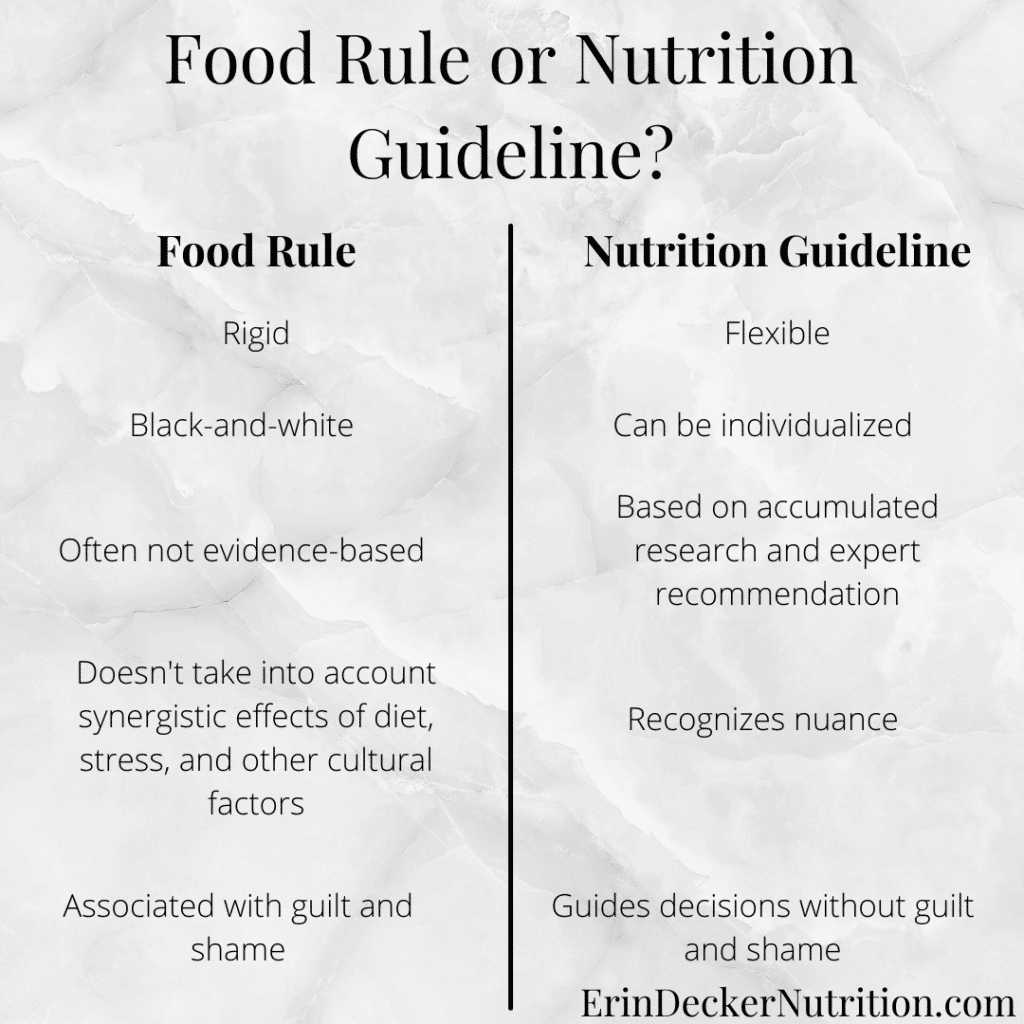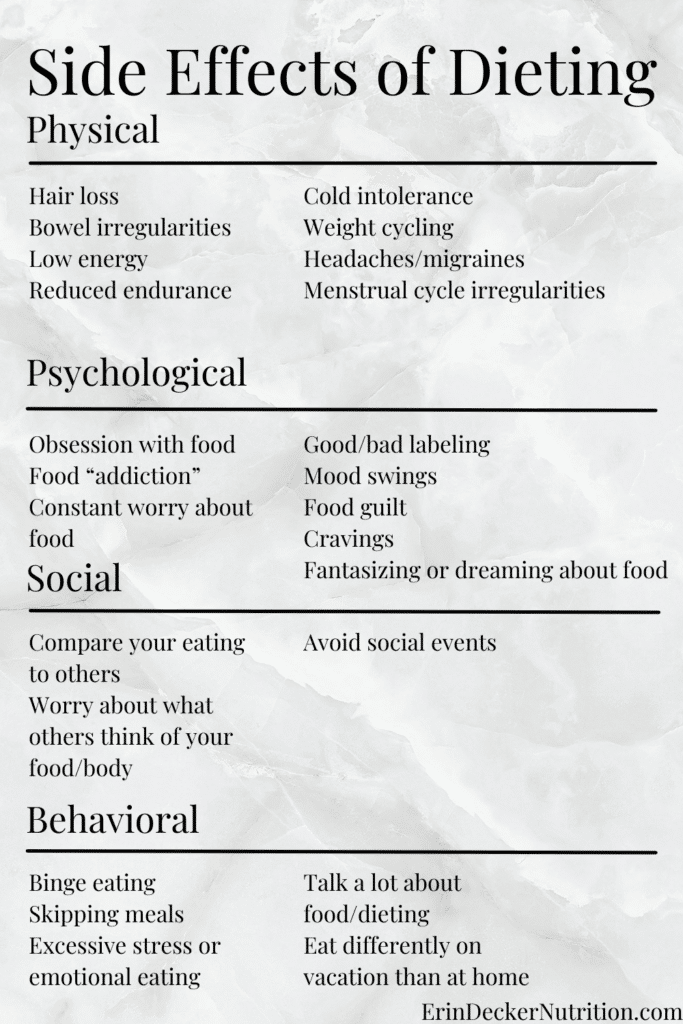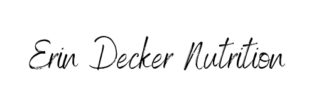If you are considering a non-diet approach, you might not know where to start. Diet culture leads us to believe that dieting is the only way to meet your health and wellness goals. If you are choosing not to diet, can you still address your health? My resounding answer is YES! Your first step is to learn how to stop dieting.
Before jumping into the steps, let me outline the dangers in dieting.
The Danger in Dieting
I realize that a heading such as the “danger in dieting” sounds kind of ridiculous. I mean, everyone goes on a diet! Your doctor has probably been on a diet! We only hear the positives of “diet and exercise”!
And I will say that simply trying to make healthier food choices and move more is NOT a dangerous behavior in and of itself. I mean, I am a dietitian and help people do this every day.
So, when I explain the “danger in dieting”, I am describing the unforeseen side effects of restriction.
Negative effects of dieting
For most people, “dieting” means eating less and moving more.
Some people can go on a diet, achieve their goals, and move on. Others cannot.
When we don’t meet our goals, it can lead to behaviors such as further restriction, over-exercising, and negative thoughts about ourselves and our bodies.
Dieting causes hair loss and brittle nails
Hair and nails required adequate calories and protein. Restricting food too severely can contribute to hair loss and weak and brittle nails.
Dieting causes bad breath
When calorie intake falls too low, the body does not have enough glucose on hand to support normal brain and cell functioning. As a result, it switches to an alternative fuel source: ketones.
While it is amazing that our bodies are able to adapt, relying on ketones for energy can contribute to bad breath due to their slightly acidic and alcoholic smell.
Dieting Contributes to Low Energy
How many calories a body requires to function optimally depends on a variety of factors such as age, body size, genetics, and activity level. Low calorie intake can cause low energy and fatigue.
Additionally, it may make it more difficult to sleep at night, further contributing to the problem.
Dieting contributes to IBS, heartburn, and other gastrointestinal side effects
There is a strong correlation between irritable bowel syndrome (IBS) symptoms and calorie restriction.
There are a few explanations for this:
- Calorie restriction slows down body functions, including digestion. This is one way your body conserves energy. If you are not eating much food, your body sees digestion as non-essential. This can lead to constipation, bloating, and gas.
- Your stomach produces acid in preparation for a meal. If we delay a meal or go an extended period of time without eating, this acid remains in your stomach. This can contribute to reflux and that burning sensation in your esophagus.
- A healthy gut relies on consistent access to food. Frequent dieters go through phases of restriction followed by overeating (AKA the diet cycle). This can lead to irregular bowel patterns.
Dieting Can Cause Food obsession
Restriction can contribute to an obsession with food due to psychological and physiological factors (i.e. mind AND body).
Psychologically, when we tell ourselves we can’t have something, what do we want more than anything? This is known as the ironic process theory, or white bear phenomenon. Labeling foods as off-limits automatically makes them more attractive in our mind.
In addition, our body has physiological safeguards in place to keep us focused on food. Thinking about food is one of the earlier signs of hunger. If you are restricting calories, you will always be at least a little bit hungry.
Dieting Contributes to Depression and Anxiety
While depression and anxiety are complex with multiple contributing factors, undereating can worsen these conditions.
A hungry brain is an anxious brain. This is evident in the classic Minnesota starvation experiment. When we are undereating, it is common to see increased anxiety, withdrawal from our usual activities, sleep disruptions, low energy, and reduced concentration abilities.
Dieting Leads to Weight Cycling
Weight cycling is the loss and regain of weight over time (AKA “yo-yo dieting”). Many people find that their first diet leads to their biggest or most “successful” weight loss, followed by a rebound weight gain that is higher than their starting point.
Repeating this pattern is known as weight cycling and is associated with increased cardiovascular disease risk.
Dieting Contributes to Eating Disorders
Not EVERYONE who goes on a diet will develop an eating disorder. Eating disorders are incredibly complex psychological and physiological conditions.
That being said, dieting is a major risk factor for developing an eating disorder. In addition, disordered eating can exist on a spectrum. You can certainly be suffering from the many side effects of an eating disorder without meeting the criteria for a clinical diagnosis. For example, everything we outlined above could be symptoms of an underlying eating disorder.
How to Stop Dieting
Just stop! Ha! If only it were that easy.
But what does it mean to stop dieting? What is a “diet” versus a healthy behavior or nutrition guideline?
A diet normally has a set of food rules. Rules tend to be rigid and black-and-white. Healthy behaviors and guidelines tend to be more flexible and forgiving. See below!

That being said, there is always room to explore nutrition after you make peace with food. Your health won’t decline if you take a break to heal your relationship with food, and in fact it will likely improve!
Get started by breaking the diet cycle.
Stop the Diet Cycle
First and foremost, stop the diet cycle. Give up the idea that this next new diet will be the one that is successful. If you are having trouble doing this, take some time to assess the damage that dieting has done to you.
Some examples may include:
| Physical | Psychological | Social | Behavioral |
| Hair loss Bowel irregularities Extreme hunger Low energy Reduced endurance Cold intolerance Weight cycling Headaches/migraines Menstrual cycle irregularities | Obsession with food Food “addiction” Constant worry about food Good/bad labeling Mood swings Food guilt Cravings Fantasizing or dreaming about food | Compare your eating to others Worry about what others think of your food/body Avoid social events | Binge eating Skipping meals Excessive stress or emotional eating Talk a lot about food/dieting Eat significantly different on vacation than at home |

Follow a non-diet approach
A non-diet approach is an approach to health and wellness without restriction. It is an “all-foods-fit” approach that eliminates guilt and shame.
This approach is one that removes weight from the equation. When we focus on our health without the pursuit of weight loss, many people find that they have better relationships with food and their body and improved self-esteem.
Work with an anti-diet or non-diet dietitian
Non-diet dietitians are equipped to assess your relationship with food and help you navigate health and nutrition without triggering the urge to restrict or change your body. They can help you find the line between diet culture and gentle nutrition to support health and wellbeing.
If you are struggling with negative body image, a non-diet dietitian can help you navigate your relationship with food and your body and can connect you with a therapist as well.
Experiment with Intuitive Eating
Intuitive eating is a pattern of eating that promotes a connection with internal hunger and fullness cues. It supports unconditional permission to eat and the act of making peace with food. Most people who follow a pattern or intuitive eating find they have improved self esteem, greater variety in food choices, improved health markers, reduced obsession with food and body and tend to sit at a lower BMI overall.
Want to get started with intuitive eating? Download my free tips below!

While one may be thinking of starting a diet, stopping one is an interesting topic, especially if there is a change in one’s health routine. Great insight shared here!